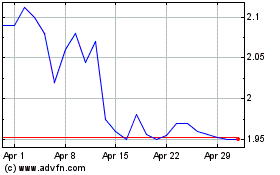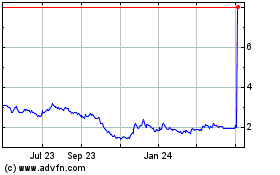Aeterna Zentaris Inc. (NASDAQ: AEZS) (TSX: AEZS) (“Aeterna” or the
“Company”), a specialty biopharmaceutical company developing and
commercializing a diversified portfolio of pharmaceutical and
diagnostic products, today announced that results from pre-clinical
studies of Aeterna’s AIM Biologicals for the potential treatment of
Parkinson’s Disease (“PD”) were accepted for presentation at
IMMUNOLOGY2022™, the Annual Event of the American Association of
Immunologists, to be held May 6-10, 2022 in Portland, Oregon.
The abstract was selected for poster
presentation and oral presentation at the congress, which will be
given by Prof. Joerg Wischhusen, PhD, Head of the Laboratory of
Experimental Tumor Immunology, Department of Obstetrics and
Gynecology, School of Medicine, University of Wuerzburg (“the
University”). Details of the abstract and presentations are as
follows:
Title: α-synuclein peptides
presented on chimeric MHC class Ib molecules prevent loss of
substantia nigra neurons in an animal model for Parkinson’s
disease1Number:
P931Category: Therapeutic Approaches to
Autoimmunity
Oral Presentation
| Session Title: |
Immune-Based
Therapeutics for Neurological Disease |
| Date and time: |
Friday, May 6, 2022, at 2:15 –
2:30 PM PT |
| Location: |
Room B113-116, Oregon Convention
Center (OCC), Portland, Oregon, USA |
Poster Presentation
| Session Title: |
Therapeutic Approaches
to Autoimmunity and Other Diseases |
| Date and time: |
Saturday, May 7, 2022, at 2:30 –
3:45 PM PT |
| Location: |
Exhibition Hall, Oregon
Convention Center (OCC), Portland, Oregon, USA |
“We are pleased that this abstract was accepted
for presentation at IMMUNOLOGY2022, the largest annual immunology
event worldwide,” commented Dr. Klaus Paulini, Chief Executive
Officer of Aeterna Zentaris. “In collaboration with Aeterna, Prof.
Wischhusen, Prof. Chi Wang Ip, and their teams at the University
are advancing the in-vitro and in-vivo characterization of
α-synuclein specific AIM Biologicals to explore the therapeutic
potential in PD. We are encouraged by the data being presented from
AAV-A53T-α-synuclein Parkinson’s disease mice, a new mouse model
which replicates human PD with high validity.”
Prof. Joerg Wischhusen of the University, added,
“My co-inventor Valentin Bruttel and I collaborated with the group
of Prof. Ip at the Department of Neurology to show that treatment
of PD mice with α-synuclein specific AIM Biologicals prevents the
development of mobility impairments. Further, we were pleased to
see the induction of antigen-specific regulatory T cells and rescue
of dopaminergic neurons in the substantia nigra. We are very much
looking forward to exploring the therapeutic potential of AIM
Biologicals in this disease together with Aeterna’s team.”
The abstract is now available through the AAI
Events conference app.
About Parkinson’s
Disease
(PD)
Parkinson’s disease is a neurodegenerative
movement disorder affecting over 7 million people worldwide. PD
belongs to a family of disorders termed synucleinopathies, which
exhibit a characteristic deposition of α-synuclein aggregates in
so-called Lewy bodies. Degeneration of dopaminergic neurons in the
substantia nigra (SN) leads to a loss of dopaminergic transmission
in the striatum. Neuroinflammation is a well-established hallmark
of the disease. Recent data provide growing evidence for a strong
autoimmune component in PD, with α-synuclein-specific T cell
responses playing a key role in disease progression.
About AIM
Biologicals
AIM Biologicals utilize a novel mechanism based
on peptide antigens that are presented on immunosuppressive MHC
class I molecules, to selectively and efficiently induce
antigen-specific tolerance. Based on this mechanism, the targeted
immunomodulating therapeutics are designed as optimized soluble
molecules that are adapted to selectively induce tolerance to
various autoantigens. Pre-clinical studies conducted by the
University thus far indicate that tolerance induction appears to be
achieved via selective elimination of antigen-specific immune
effector cells and via induction of antigen-specific regulatory T
cells from naïve T cells.
α-synuclein-specific AIM Biologicals may thus
have the potential to become a highly specific and effective
treatment of PD.
For the development of AIM Biologicals as
potential PD therapeutics, Aeterna utilizes, among others, an
innovative animal model on neurodegeneration by
α-synuclein-specific T cells in AAV-A53T-α-synuclein Parkinson’s
disease mice, which has recently been published by University of
Wuerzburg researchers.
About Aeterna Zentaris
Inc.Aeterna Zentaris is a specialty biopharmaceutical
company developing and commercializing a diversified portfolio of
pharmaceutical and diagnostic products focused on areas of
significant unmet medical need. The Company's lead product,
macimorelin (Macrilen™; Ghryvelin®), is the first and only U.S. FDA
and European Commission approved oral test indicated for the
diagnosis of adult growth hormone deficiency (AGHD). The Company is
leveraging the clinical success and compelling safety profile of
macimorelin to develop it for the diagnosis of childhood-onset
growth hormone deficiency (CGHD), an area of significant unmet
need, in collaboration with Novo Nordisk.
Aeterna Zentaris is dedicated to the development
of therapeutic assets and has recently taken steps to establish a
growing pre-clinical pipeline to potentially address unmet medical
needs across a number of indications, including neuromyelitis
optica spectrum disorder (NMOSD), Parkinson's disease (PD),
hypoparathyroidism and amyotrophic lateral sclerosis (ALS; Lou
Gehrig's disease). Additionally, the Company is developing an oral
prophylactic bacterial vaccine against SARS-CoV-2 (COVID-19) and
Chlamydia trachomatis.
For more information, please visit
www.zentaris.com and connect with the Company on Twitter, LinkedIn
and Facebook.
Forward-Looking Statements
This press release contains statements that may
constitute forward-looking statements within the meaning of U.S.
and Canadian securities legislation and regulations and such
statements are made pursuant to the safe-harbor provision of the
U.S. Securities Litigation Reform Act of 1995. Forward-looking
statements are frequently, but not always, identified by words such
as “expects,” “anticipates,” “believes,” “intends,” “potential,”
“possible,” and similar expressions. Such statements, based as they
are on current expectations of management, inherently involve
numerous risks, uncertainties and assumptions, known and unknown,
many of which are beyond our control. Forward-looking statements in
this press release include, but are not limited to, those relating
to: expectations regarding conducting pre-clinical research to
identify and characterize an AIM Biologicals-based development
candidate for the treatment of PD.
Forward-looking statements involve known and
unknown risks and uncertainties, and other factors which may cause
the actual results, performance or achievements stated herein to be
materially different from any future results, performance or
achievements expressed or implied by the forward-looking
information. Such risks and uncertainties include, among others,
results from ongoing or planned pre-clinical studies of our
products under development may not be successful or may not support
advancing the product to human clinical trials; our ability to
raise capital and obtain financing to continue our currently
planned operations; our now heavy dependence on the success of
Macrilen™ (macimorelin) and related out-licensing arrangements and
the continued availability of funds and resources to successfully
commercialize the product, including our heavy reliance on the
success of the license agreement and the amended license agreement
(collectively the Novo Amended License Agreement); the global
instability due to the global pandemic of COVID-19 and the war in
the Ukraine and the resulting geopolitical instability, and its
unknown potential effect on our planned operations; our ability to
enter into out-licensing, development, manufacturing, marketing and
distribution agreements with other pharmaceutical companies and
keep such agreements in effect; and our ability to continue to list
our common shares on the NASDAQ. Investors should consult our
quarterly and annual filings with the Canadian and U.S. securities
commissions for additional information on risks and uncertainties,
including those risks discussed in our Annual Report on Form 20-F
and annual information form, under the caption "Risk Factors".
Given the uncertainties and risk factors, readers are cautioned not
to place undue reliance on these forward-looking statements. We
disclaim any obligation to update any such factors or to publicly
announce any revisions to any of the forward-looking statements
contained herein to reflect future results, events or developments,
unless required to do so by a governmental authority or applicable
law.
No securities regulatory authority has either
approved or disapproved of the contents of this news release. The
Toronto Stock Exchange accepts no responsibility for the adequacy
or accuracy of this release.
Investor Contact:
Jenene ThomasJTC TeamT (US): +1 (833) 475-8247E:
aezs@jtcir.com
1 J. Wischhusen, J. Wu, F. Ahsan, R. McFleder,
A. Karl, S. Mamatha Jayaram, H. Wecklein, A. Nienaber, D. Brünnert,
V. Bruttel, and C. Wang Ip. 2022. α-synuclein peptides presented on
chimeric MHC class Ib molecules prevent loss of substantia nigra
neurons in an animal model for Parkinson’s disease. Presented
at: IMMUNOLOGY2022™, Annual Meeting of The American
Association of Immunologists, May 5 – 10, The American Association
of Immunologists, Inc., Portland, Abstract 2150
Aeterna Zentaris (NASDAQ:AEZS)
Historical Stock Chart
From Aug 2024 to Sep 2024

Aeterna Zentaris (NASDAQ:AEZS)
Historical Stock Chart
From Sep 2023 to Sep 2024
